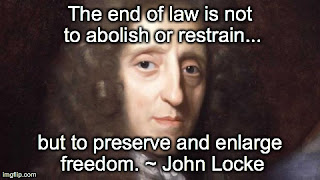Hopefully over the last three posts on the Three Key Steps required for the Rule of Law, you've not only followed along, but also felt some concern about where I've been going with this. In New Year's Eve's post, I emphasized the importance of Philosophy and questioned the common assumptions that the Big Ideas of the West have little or nothing to do with everyday life, and in New Year's Day post we looked at how, through the ideas of men like John Locke, The Law, in a general sense, functions as applied Philosophy. But then at the opening and close of my previous post on Property, showing how it is central to those steps being completed and a society able to enjoy the Pursuit of Happiness, I cautioned that,
"... you should be uneasy about the "♫ ♪ ♬ it's as easy as 1,2,3...♬ ♪ ♫" nature of these three steps to the Rule of Law that I've given."And you should be cautious towards anyone promoting the idea that 'Men of Reason know what's best!' - if you know anything about the French Revolution, or even the PC Culture of our Wackademic Universities, that should be cause for serious and well founded alarm. Stick with me, because in this post, as we look at how The Law does have a very real and direct connection into our daily lives through the concept of Property, and the West's Big Ideas, we'll also see that the Rule of Law, as our Founders understood it, provided an antidote to the very real threat of 'those who know best!'.
As we've seen, the initial hardships and innovations of the first colonists in America, were hard and clarifying experiences, which made their way back to the old world through the actions and words of men like Thomas Hooker (see the previous post), and they helped in establishing clearer understandings of what Liberty required, as well as the need for limits to what the Law could and should do. Such experiences had an influence on the pens of men like John Locke, who, decades later, distilled those essential principles of life, liberty and property, into a clearer understanding of the importance of the Rule of Law. Americans drank those ideas in, embodied and refined them even further still, as an 'expression of the common mind' through the pen of Thomas Jefferson, as life, liberty and the pursuit of happiness, but that phrase expressed far more than simply swell sounding words.
In this series of posts, we've traced a line from Aristotle, to Cicero, Coke, Locke and our Founders and have stressed the importance of knowledge and reason, but there is a very real danger in giving the impression that Reason alone is fit to describe or lay down the law - and in fact letting it do so comes dangerously close to violating one of the first maxim's we noted, that above all else,
'No one can be judge in his own cause; Hear the other side'To ignore that, to put your exalted 'Reason' above that, is the path of self inflated elitism, be it of Kings, Experts or Talking Heads, and it is our Laws themselves, when respected, that save us from that. On the other hand, Reason, when given power to depart from the wider reality of a nations laws, not because an error has been found in earlier judgments (which is a valid basis for overturning precedent), but because a judge, legislator or executive has a 'better idea' for 'the greater good' in spite of their existing laws, that is when 'Reason' becomes just as dangerous a beast as any other predator in the jungle. The French Revolution was a good example of that, where for all its talk of 'Reason!', it brought unreasonable rivers of blood and mounds of severed heads until finally, it provided sufficient reasons for the greatest tyrant since Alexander, Napoleon Bonaparte, to come to power and plunge Europe into a decade of devastating war and conquest.
The English Jurist Edward Coke, understood very well, the dangers of individual men's reason being given power to define or direct the law, and his unique formulation of an answer to that, helped him in holding his own king at bay:
Notes on Coke: 1608 "Then the king said that he thought the law was founded upon reason, and that he and others had reason as well as the judges. To which it was answered by me that true it was that God had endowed His Majesty with excellent science and great endowments of nature; but His Majesty was not learned in the laws of his realm of England, and causes which concern the life or inheritance or goods or fortunes of his subjects are not to be decided by natural reason, but by the artificial reason and judgment of law , which law is an act which requires long study and experience, before that a man can attain to the cognizance of it "Meaning, that it was not enough for one man, one king, one executive, or even an entire legislature, to consider and declare the law to be this or that, separately from the body of the law - that would be every bit the 'rule of rules' as any other arbitrary whim someone justifies to themselves - it is placing you as a judge of your own cause.
Artificial Reason, as Coke spoke of it, required reasoning along with, and in concert with, preceding judgments that made up the common law, which served as a steadying rudder against the whims of the moment's 'Good Idea!' from steering society in a new, unexpected and rash direction. It is not



